
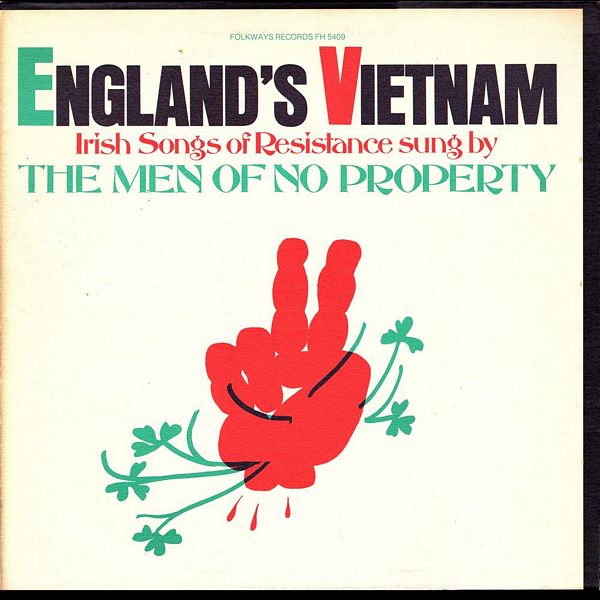 |
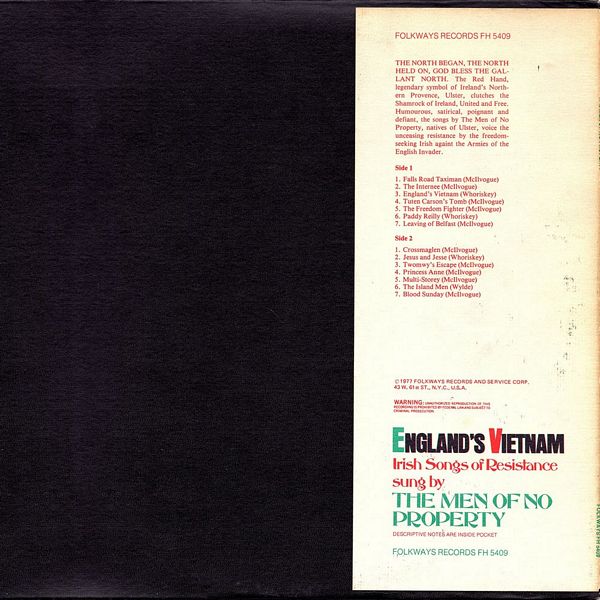
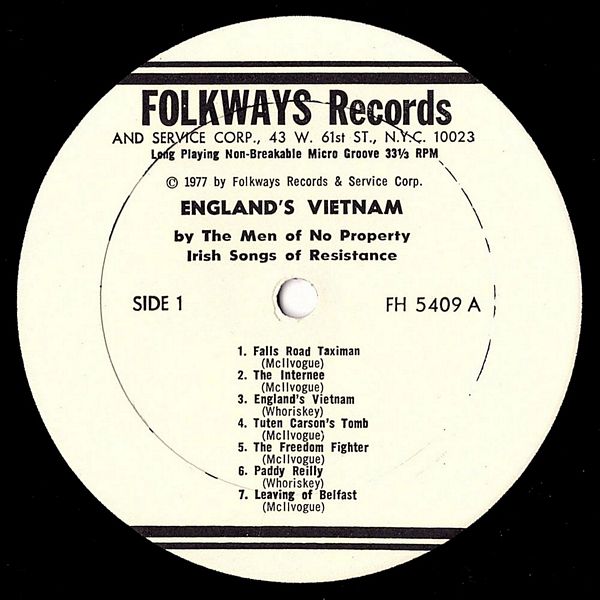
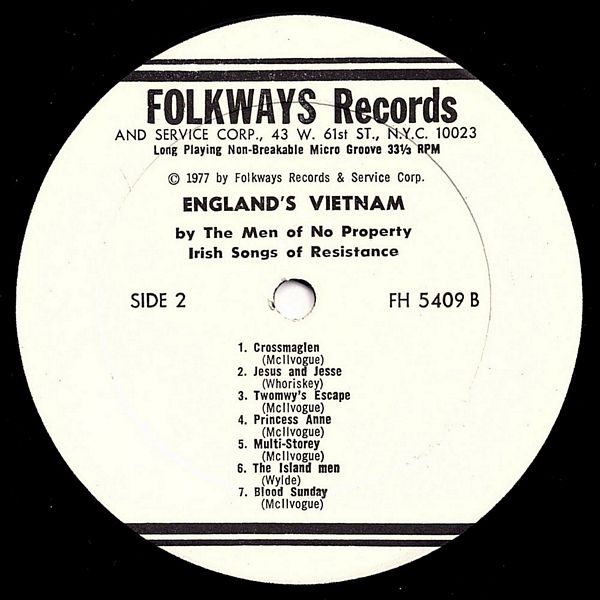
|
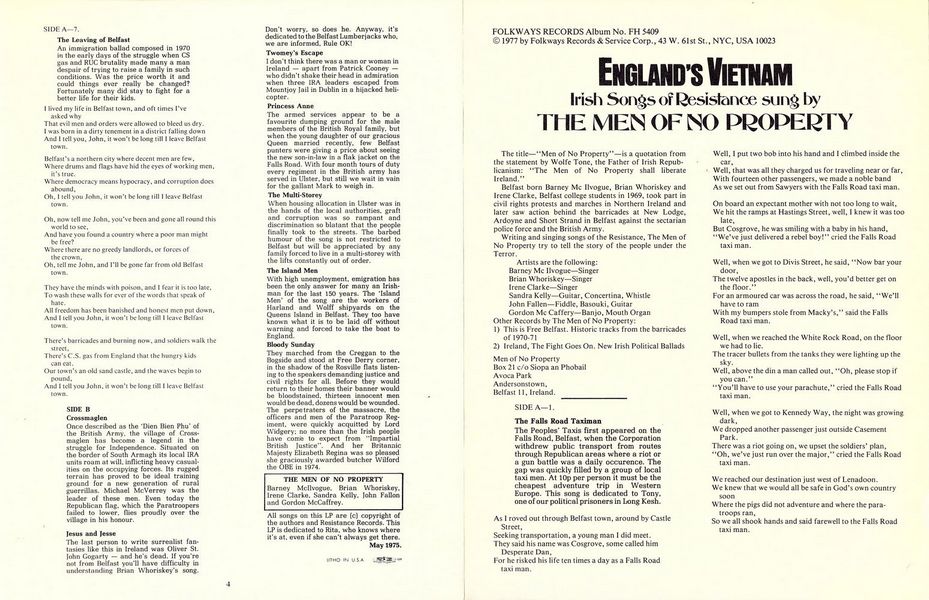
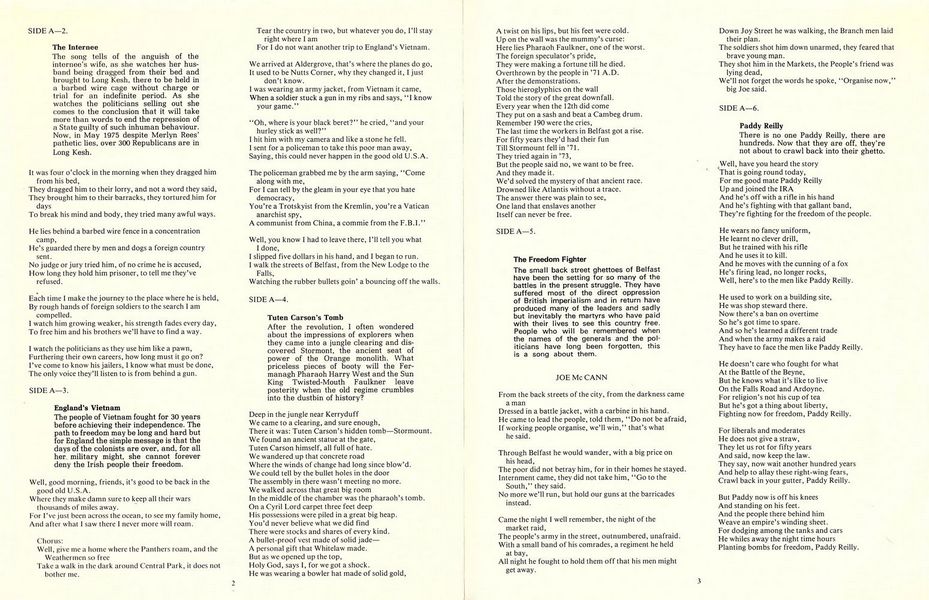
|
Sleeve Notes
THE NORTH BEGAN, THE NORTH HELD ON, GOD BLESS THE GALLANT NORTH.
The Red Hand, legendary symbol of Ireland's Northern Provence, Ulster, clutches the Shamrock of Ireland, United
and Free. Humourous, satirical, poignant and defiant, the songs by The Men of No Property, natives of Ulster, voice
the unceasing resistance by the freedom-seeking Irish against the Armies of the English Invader.
The title — "Men of No Property" — is a quotation from the statement by Wolfe Tone, the Father of Irish Republicanism: "The Men of No Property shall liberate Ireland."
Belfast born Barney McIlvogue, Brian Whoriskey and Irene Clarke, Belfast college students in 1969, took part in civil rights protests and marches in Northern Ireland and later saw action behind the barricades at New Lodge, Ardoyne and Short Strand in Belfast against the sectarian police force and the British Army.
Writing and singing songs of the Resistance, The Men of No Property try to tell the story of the people under the Terror.
The Falls Road Taximan — The Peoples' Taxis first appeared on the Falls Road, Belfast, when the Corporation withdrew public transport from routes through Republican areas where a riot or a gun battle was a daily occurrence. The gap was quickly filled by a group of local taxi men. At lOp per person it must be the cheapest adventure trip in Western Europe. This song is dedicated to Tony, one of our political prisoners in Long Kesh.
The Internee — The song tells of the anguish of the internee's wife, as she watches her husband being dragged from their bed and brought to Long Kesh, there to be held in a barbed wire cage without charge or trial for an indefinite period. As she watches the politicians selling out she comes to the conclusion that it will take more than words to end the repression of a State guilty of such inhuman behaviour. Now, in May 1975 despite Merlyn Rees' pathetic lies, over 300 Republicans are in Long Kesh.
England's Vietnam — The people of Vietnam fought for 30 years before achieving their independence. The path to freedom may be long and hard but for England the simple message is that the days of the colonists are over, and, for all her military might, she cannot forever deny the Irish people their freedom.
Tuten Carson's Tomb — After the revolution, I often wondered about the impressions of explorers when they came into a jungle clearing and discovered Stormont, the ancient seat of power of the Orange monolith. What priceless pieces of booty will the Fermanagh Pharaoh Harry West and the Sun King Twisted-Mouth Faulkner leave posterity when the old regime crumbles into the dustbin of history?
The Freedom Fighter — The small back street ghettoes of Belfast have been the setting for so many of the battles in the present struggle. They have suffered most of the direct oppression of British imperialism and in return have produced many of the leaders and sadly but inevitably the martyrs who have paid with their lives to see this country free. People who will be remembered when the names of the generals and the politicians have long been forgotten, this a song about them.
Paddy Reilly — There is no one Paddy Reilly, there are hundreds. Now that they are off, they're not about to crawl back into their ghetto.
The Leaving of Belfast — An immigration ballad composed in 1970 in the early days of the struggle when CS gas and RUG brutality made many a man despair of trying to raise a family in such conditions. Was the price worth it and could things ever really be changed? Fortunately many did stay to fight for a better life for their kids.
Crossmaglen — Once described as the 'Dien Bien Phu' of the British Army, the village of Crossmaglen has become a legend in the struggle for Independence. Situated on the border of South Armagh its local IRA units roam at will, inflicting heavy casualities on the occupying forces. Its rugged terrain has proved to be ideal training ground for a new generation of rural guerrillas. Michael McVerrey was the leader of these men. Even today the Republican flag, which the Paratroopers failed to lower, flies proudly over the village in his honour.
Jesus and Jesse — The last person to write surrealist fantasies like this in Ireland was Oliver St. John Gogarty — and he's dead. If you're not from Belfast you'll have difficulty in understanding Brian Whoriskey's song.
Don't worry, so does he. Anyway, it's dedicated to the Belfast Lumberjacks who, we are informed, Rule OK!
Twomey's Escape — I don't think there was a man or woman in Ireland — apart from Patrick Cooney — who didn't shake their head in admiration when three IRA leaders escaped from Mount joy Jail in Dublin in a hijacked helicopter.
Princess Anne — The armed services appear to be a favourite dumping ground for the male members of the British Royal family, but when the young daughter of our gracious Queen married recently, few Belfast punters were giving a price about seeing the new son-in-law in a flak jacket on the Falls Road. With four month tours of duty every regiment in the British army has served in Ulster, but still we wait in vain for the gallant Mark to weigh in.
The Multi-Storey — When housing allocation in Ulster was in the hands of the local authorities, graft and corruption was so rampant and discrimination so blatant that the people finally took to the streets. The barbed humour of the song is not restricted to Belfast but will be appreciated by any family forced to live in a multi-storey with the lifts constantly out of order.
The Island Men — With high unemployment, emigration has been the only answer for many an Irishman for the last 150 years. The Tsland Men' of the song are the workers of Harland and Wolff shipyards on the Queens Island in Belfast. They too have known what it is to be laid off without warning and forced to take the boat to England.
Bloody Sunday — They marched from the Creggan to the Bogside and stood at Free Derry corner, in the shadow of the Rosville flats listening to the speakers demanding justice and civil rights for all. Before they would return to their homes their banner would be bloodstained, thirteen innocent men would be dead, dozens would be wounded. The perpetrators of the massacre, the officers and men of the Paratroop Regiment, were quickly acquitted by Lord Widgery; no more than the Irish people have come to expect from "Impartial British Justice". And her Britannic Majesty Elizabeth Regina was so pleased she graciously awarded butcher Wilford the QBE in 1974.